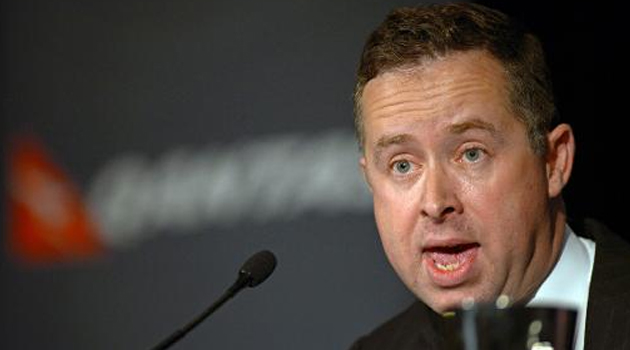SYDNEY, Nov 18 – Qantas chief executive Alan Joyce has demanded the government halt what he described as a “virtual takeover” of Virgin Australia by foreign airlines, saying they were working to destabilise the national carrier.
Singapore Airlines, Air New Zealand and Abu Dhabi based Etihad already own 63 percent of Qantas’ main domestic rival and under a Aus$350 million (US$328 million) capital raising announced last week, that could increase to as much as 72 percent.
In a searing letter to Prime Minister Tony Abbott and all state governments, seen by the Australian Financial Review, Joyce charged it was the “final act” by “predatory” state owned airlines to cripple Qantas both domestically and internationally.
Joyce’s ultimate fear is that the capital raising, “supported and largely underwritten by three foreign governments”, was part of a strategy of subsidising Virgin so it could continue to undercut Qantas on profitable domestic routes.
The domestic sector is a key money spinner for the airline and it has helped prop up its underperforming international network.
In his letter, Joyce said the move by the three airlines had “all the characteristics of predator behaviour (to) substantially weaken a major competitor, Qantas Group, and recoup the costs at a later date”, the newspaper reported.
Qantas confirmed in a statement Monday that a letter had been sent “to express concerns, as the national carrier, about potentially damaging shifts in Australia’s aviation industry”.
“Virgin Australia’s proposed capital raising could see its foreign ownership rise to more than 80 percent without the need for any further regulatory approval,” the statement said.
“Despite this, the airline would retain all the traffic rights given to Australian carriers.
“If wholly privatised, Virgin Australia’s ability to receive potentially unlimited capital from its government-backed owners would seriously distort the domestic aviation market for the benefit of foreign interests.
“The decision of these shareholders to invest in Virgin Australia’s loss making strategy highlights that these airlines aren’t subject to the same commercial realities as Qantas.”
It demanded Canberra “fully examine the motives behind the virtual takeover of Virgin Australia by foreign airlines, and to prevent destabilising of the domestic aviation industry, local tourism and jobs”.
Qantas said the situation was compounded by the disadvantage it experienced from the restrictions imposed by the Qantas Sale Act when it was privatised in 1995, which limits foreign ownership in the national carrier to 49 percent.
Joyce said the government should urgently revisit the “outdated policy framework”.
The Australian and International Pilots Association backed Joyce, arguing the playing field has become skewed due to the rising influence of foreign government controlled investment in the market.
“Qantas is an iconic Australian company and has been a massive contributor to our national employment, skills base and economy for the better part of a century. Allowing it to be white-anted by an unfair competitive environment is not in the national interest,” AIPA president Nathan Safe said.
Treasurer Joe Hockey has not responded publicly to Qantas’ claims but Virgin chief John Borghetti hit back, saying the airline’s emergence had ended a monopoly in the Australian market.
“Fundamentally the landscape has changed forever, and it is no longer a monopoly,” he told the Sydney Morning Herald.
“‘This is all about competition and the creation of more jobs, and helping the tourism sector, which in the current global climate certainly can use all the help it can get.”


































